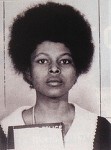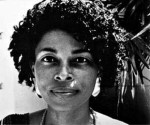COLLEGE FEMINISMS: Dear Assata: You Are More of a Woman than America Told You
By Christine Ohenewah
Recent news about the FBI’s latest addition to their Most Wanted Terrorist list and the strong recommendation of my mentor prompted me to pick up Assata Shakur’ s autobiography.
Assata Olugbala Shakur was born JoAnne Deborah Byron on July 16, 1947, in Jamaica, New York. Adapting an African name, she took on Assata, meaning “she who struggles,” Olugbala, meaning “love for the people,” and Shakur, (taken out of respect for her friend Zayd Shakur) meaning “the thankful.” The first woman to be placed on the FBI’s Most Wanted Terrorist list, Shakur was a member of the Black Panther Party and Black Liberation Army in the late 1960s and 1970s. COINTELPRO, an FBI counterintelligence program employed by the government to disrupt Black and leftist organizations, successfully infiltrated these organizations, and targeted many members, including Shakur. In the early 1970s, several false criminal accusations for murder, robbery, and kidnapping were brought against Shakur. All except for one were later acquitted or dismissed. In 1973, Shakur and two other friends were cornered by state troopers on the New Jersey Turnpike, and became involved in a shootout where she was severely wounded, apprehended, and charged for the murder of Werner Foerster, a New Jersey State Trooper. Although Shakur adamantly insisted on her innocence, and subsequent medical and forensic evidence additionally proved it was not possible for her to have shot Foerster, she was nevertheless convicted for Foerster’s murder and incarcerated in several prisons throughout the 1970s until she escaped to Cuba where she received political asylum.
The FBI’s animalistic hunting of Shakur resumed after nearly 40 years when it labeled her a terrorist and offered $2 million for her capture. This action has sent a message to all Black women in America: that we are less than women. Their manhunt has made clear that the oppression of Black women in America is far from nonexistent. And there is definitely something to be said about the fact that two of our most prominent African American leaders, President Barack Obama and Attorney General Eric Holder, have done nothing to halt Shakur’s targeting.
“I remind myself that Black people in Amerika are oppressed. It’s necessary that I do that. People get used to anything. The less you think about your oppression, the more your tolerance for it grows” (262).
–Assata Shakur, Assata: An Autobiography
A week has passed since I closed the last page of Assata Shakur’s gripping autobiography. However, the anger that mercilessly fumed within my cheeks while reading her words caused me to critically revisit the state of Black women in America and where we are placed on the steep ladder that defines our womanhood.
Growing up in White suburbia, I was swallowed up by standards of what it meant to be beautiful and adored as a woman. In my predominantly White Catholic high school of barely 200, I would continuously stand by and observe as a majority of the White girls received positive attention from the boys and themselves about their appearances. The less opinionated girls who behaved innocently garnered even more affection and were treated with a sweet fragility. Seldom was this adoration passed on to me, despite my best attempts to dress in the same fashion as the other White girls and behave nicely. This exclusion silently communicated to me that I was somehow repulsive and unwanted. And I now understand that the legacy of racial and sexual oppression that haunts Black women mildly manifested itself in the special attention given to these White girls.
“With each here comes a crash…More thumps and punches, but none of them hurts as bad as my chest is hurting…My chest erupts and i think i am gonna die. They go on and on. Questions and bangs. I think they will never stop” (5).
–Assata Shakur, Assata: An Autobiography
When I read that Ms. Shakur was beaten by the police, when I read that she was refused decent medical care for her pregnancy while caged in a maximum security prison, and additionally that she was placed in a men’s prison facility, I realized that in America’s eyes, Black women are not respectable. Pragmatically speaking, we have been ruthlessly shoved to the very bottom, ignored, despised, and dubbed less than women, since slavery. Zora Neale Hurston precisely captures the position of Black women when she writes:
“So de white man throw down de load and tell de nigger man tuh pick it up. He pick it up because he have to, but he don’t tote it. He hand it to his womenfolks. De nigger woman is de mule uh de world so fur as Ah can see” (17).
–Nanny, Their Eyes Were Watching God
I am now in college, and I have grown deeply conscious of the reality that being a woman in America has implied maintaining the likeness of a white woman. It has meant possessing bouncy, luscious hair and maintaining a bony, slim physique. It has meant being complacent, “decent,” and “well-behaved.” It has meant being treated as precious as a porcelain doll that is subject to break if not handled carefully. And it has meant that if you are found missing, the police and media will lose countless nights of sleep to ensure that you are home safe. As noted by African American abolitionist and women’s rights activist Sojourner Truth, Black women have been disgracefully omitted from this realm of what it means to be a woman in America:
“That man over there says that women need to be helped into carriages, and lifted over ditches, and to have the best place everywhere. Nobody ever helps me into carriages, or over mud-puddles, or gives me any best place! And ain’t I a woman?” (160).
— bell hooks, Ain’t I a Woman
There is no doubt that Black women have always been strong and can fend for themselves. Ms. Shakur exemplifies Black women’s tenacity through her elusion of the American prison system, thus defying her own modern-day enslavement. However, like Ms. Shakur, Black women are not superhuman. Our strength is not an invitation for our indecent treatment. So, as a heterosexual, 19-year-old Black woman, I admit that I do not mind strolling down an avenue and having various men compliment my beauty. I do not mind if a man is kindly willing to hold a door open for me or insist on paying for my dinner if we are on a date. First, I will clarify that the compliments I receive do not vulgarly objectify my body. I would not be flattered, and I do not condone women being reduced to mere commodities. I am also aware that other women (mainly White women in my experience) may deem the gestures above as oppressive, and I can understand why. However, I do not readily share this same view because such gestures counter the historical and contemporary beliefs surrounding my identity as being ugly, undesirable, and undervalued. I would rather be treated like a porcelain doll any day than to be shot at, cursed at, and called a ”nigger whore” like one police officer called Ms. Shakur:
“Is your mother a nigger whore like you? We don’t allow no pickaninnies at this hospital” (11).
–Assata Shakur, Assata: An Autobiography
Mainstream feminism encourages women to achieve equality and to reject social norms of femininity. However, Black feminism teaches me that not all men are equal to all women and that Black and White women share different struggles. For Black women, one of those struggles is the way our womanhood is harshly devalued.
“The slavemasters taught us we were ugly, less than human, unintelligent, and many of us believed it…A Black woman was fair game for anyone at any time…She was considered less than a woman. She was a cross between a whore and a workhorse” (116).
–Assata Shakur, Assata: An Autobiography
The brutality that Assata Shakur has faced and the FBI’s doubling the reward for her kidnapping provide shameful proof that Black women are still treated as less than women. Yet, the courage that Ms. Shakur has continuously demonstrated in the wake of government threats—being unjustly targeted for advancing the struggle of Black Americans or facing FBI accusations for domestic terrorism—nevertheless shows she is a heroine who deserves every bit of decency, respect, and appreciation that exists in our hate-infested universe. Ms. Shakur is the silver lining that lets Black women know that although we have a long path to travel, we are still wonderful human beings who should seize a sense of self pride from the dark clouds that enshroud us. As she beautifully states,
“Rhinoceros Woman—
This world is blind
And slight of mind
And cannot see
How beautiful you are
I saw your light
And it was shining” (262)
–Assata Shakur, Assata: An Autobiography
Yes, Ms. Shakur, your light shines. And you are more of a woman than America told you.
Bibliography
hooks, bell. Ain’t I A Woman. Boston: South End Press, 1981. Print.
Neale Hurston, Zora. Their Eyes Were Watching God. New York: Harper Collins
Publishers, 2000. Print.
Shakur, Assata. Assata: An Autobiography. Chicago: Lawrence Hill Books, 2001. Print.
 Christine Ohenewah is a junior majoring in American Studies and Political Science at Macalester College. She was born in Accra, Ghana, and currently lives in Mankato, Minnesota, having been raised in North America most of her life. Under the mentorship of Professor Duchess Harris, Christine’s summer research through the Mellon Mays Undergraduate Fellowship focuses on issues surrounding Black women in American society and engages feminist, historical, and theoretical scholarly literatures to explore their invisibility and the division it enables among them.
Christine Ohenewah is a junior majoring in American Studies and Political Science at Macalester College. She was born in Accra, Ghana, and currently lives in Mankato, Minnesota, having been raised in North America most of her life. Under the mentorship of Professor Duchess Harris, Christine’s summer research through the Mellon Mays Undergraduate Fellowship focuses on issues surrounding Black women in American society and engages feminist, historical, and theoretical scholarly literatures to explore their invisibility and the division it enables among them.




7 Comments